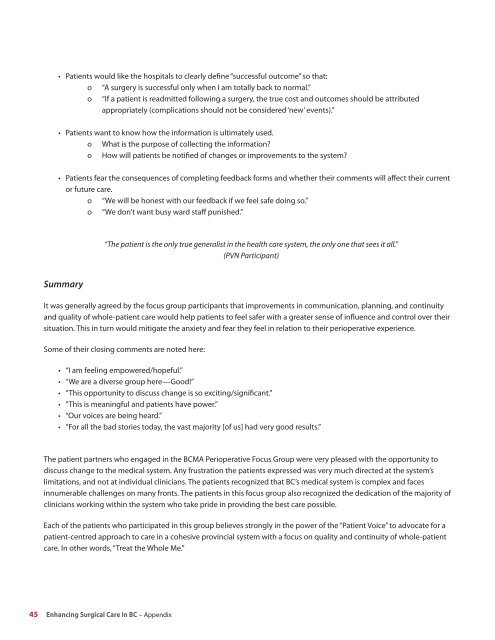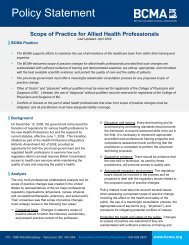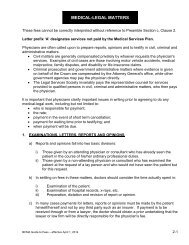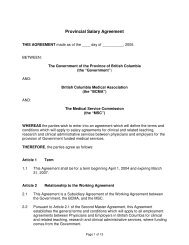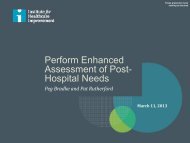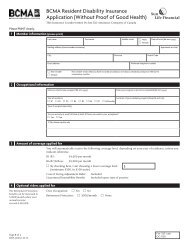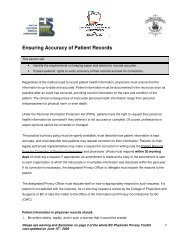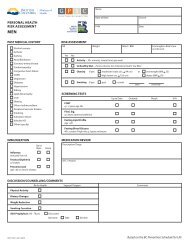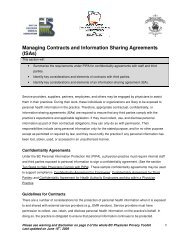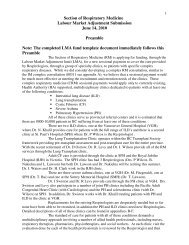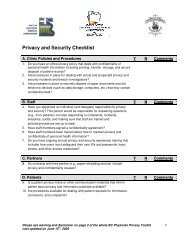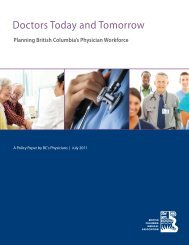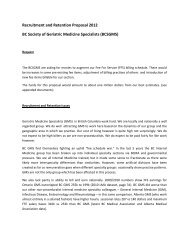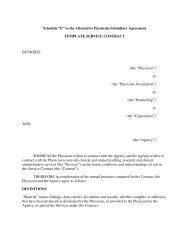• Patients would like the hospitals to clearly def<strong>in</strong>e “successful outcome” so that: o “A surgery is successful only when I am totally back to normal.” o “If a patient is readmitted follow<strong>in</strong>g a surgery, the true cost and outcomes should be attributed appropriately (complications should not be considered ‘new’ events).” • Patients want to know how the <strong>in</strong>formation is ultimately used. o What is the purpose of collect<strong>in</strong>g the <strong>in</strong>formation? o How will patients be notified of changes or improvements to the system? • Patients fear the consequences of complet<strong>in</strong>g feedback forms and whether their comments will affect their current or future care. o “We will be honest with our feedback if we feel safe do<strong>in</strong>g so.” o “We don’t want busy ward staff punished.” Summary 45 <strong>Enhanc<strong>in</strong>g</strong> <strong>Surgical</strong> <strong>Care</strong> <strong>in</strong> <strong>BC</strong> – Appendix “The patient is the only true generalist <strong>in</strong> the health care system, the only one that sees it all.” (PVN Participant) It was generally agreed by the focus group participants that improvements <strong>in</strong> communication, plann<strong>in</strong>g, and cont<strong>in</strong>uity and quality of whole-patient care would help patients to feel safer with a greater sense of <strong>in</strong>fluence and control over their situation. This <strong>in</strong> turn would mitigate the anxiety and fear they feel <strong>in</strong> relation to their perioperative experience. Some of their clos<strong>in</strong>g comments are noted here: • “I am feel<strong>in</strong>g empowered/hopeful.” • “We are a diverse group here—Good!” • “This opportunity to discuss change is so excit<strong>in</strong>g/significant.” • “This is mean<strong>in</strong>gful and patients have power.” • “Our voices are be<strong>in</strong>g heard.” • “For all the bad stories today, the vast majority [of us] had very good results.” The patient partners who engaged <strong>in</strong> the <strong>BC</strong>MA Perioperative Focus Group were very pleased with the opportunity to discuss change to the medical system. Any frustration the patients expressed was very much directed at the system’s limitations, and not at <strong>in</strong>dividual cl<strong>in</strong>icians. The patients recognized that <strong>BC</strong>’s medical system is complex and faces <strong>in</strong>numerable challenges on many fronts. The patients <strong>in</strong> this focus group also recognized the dedication of the majority of cl<strong>in</strong>icians work<strong>in</strong>g with<strong>in</strong> the system who take pride <strong>in</strong> provid<strong>in</strong>g the best care possible. Each of the patients who participated <strong>in</strong> this group believes strongly <strong>in</strong> the power of the “Patient Voice” to advocate for a patient-centred approach to care <strong>in</strong> a cohesive prov<strong>in</strong>cial system with a focus on quality and cont<strong>in</strong>uity of whole-patient care. In other words, “Treat the Whole Me.”
References Alexander, A. (2000). The National Demonstration Hospitals Program. Aust Health Rev, 23(4), 198-204. American College of Surgeons. National <strong>Surgical</strong> Quality Improvement Program Bus<strong>in</strong>ess Case. Antony, J., & Banuelas, R. (2002). Key <strong>in</strong>gredients for the effective implementation of six sigma program. Measur<strong>in</strong>g Bus<strong>in</strong>ess Excellence, 6(4), 2-27. Archer, T., & Macario, A. (2006). The drive for operat<strong>in</strong>g room efficiency will <strong>in</strong>crease quality of patient care. Curr Op<strong>in</strong> Anaesthesiol, 19(2), 171-176. Australian Department of Health and Family Services. (1997). A Review of the National Demonstration Hospitals Program Phase 1: 1995-1997. Canberra: Retrieved from http://www.health.gov.au/<strong>in</strong>ternet/ma<strong>in</strong>/publish<strong>in</strong>g.nsf/Content/ndhp-2.htm. Bab<strong>in</strong>eau, T. J., Becker, J., Gibbons, G., Sentovich, S., Hess, D., Robertson, S., et al. (2004). The “cost” of operative tra<strong>in</strong><strong>in</strong>g for surgical residents. Arch Surg, 139(4), 366-369; discussion 369-370. Balch, C. M., Freischlag, J. A., & Shanafelt, T. D. (2009). Stress and burnout among surgeons: understand<strong>in</strong>g and manag<strong>in</strong>g the syndrome and avoid<strong>in</strong>g the adverse consequences. Arch Surg, 144(4), 371-376. <strong>BC</strong> Patient Safety & Quality Council. (2011). Cl<strong>in</strong>cal <strong>Care</strong> Management, What is it and how is it supported <strong>in</strong> <strong>BC</strong>? Berk, A., Hall, G., & LeGresley, A. (2010). Reference Guide and Toolkit for Improvements <strong>in</strong> Perioperative Practice <strong>in</strong> Ontario: M<strong>in</strong>istry of Health and Long-Term <strong>Care</strong>. Bhattacharyya, T., Vrahas, M. S., Morrison, S. M., Kim, E., Wiklund, R. A., Smith, R. M., et al. (2006). The value of the dedicated orthopaedic trauma operat<strong>in</strong>g room. J Trauma, 60(6), 1336-1340; discussion 1340-1331. Braithwaite, N. Potential for Improv<strong>in</strong>g Efficiency <strong>in</strong> All Areas of Surgery, 9 December 2010, from http://www.exseromagaz<strong>in</strong>e.com/en/Process- Efficiency/ Caesar, M., Chouhan, A., & Ko, A. (2008). From Diagnosis to Cure: A Process Improvement Journey. ElectronicHealthcare, 7(2), e1-e10. Caldwell, C., Brexler, J., & Gillem, T. (2005). Lean-Six Sigma for Healthcare: A Senior Leader Guide for Improv<strong>in</strong>g Cost and Throughput (2nd. ed.). Milwaukee: American Society for Quality, Quality Press. Calmes, S. H., & Shusterich, K. M. (1992). Operat<strong>in</strong>g room management: what goes wrong and how to fix it. Physician Exec, 18(6), 43-48. Canadian Institute for Health Information. (2010). National Health Expenditure Trends, 1975 to 2010. Ottawa, ON. Canadian Patient Safety Institute. Safer Healthcare Now! Retrieved 17 January, 2011, from http://www.patientsafety<strong>in</strong>stitute.ca Cleary, P. D. (2003). A hospitalization from hell: a patient’s perspective on quality. Ann Intern Med, 138(1), 33-39. Cohn, L. H., Rosborough, D., & Fernandez, J. (1997). Reduc<strong>in</strong>g costs and length of stay and improv<strong>in</strong>g efficiency and quality of care <strong>in</strong> cardiac surgery. Ann Thorac Surg, 64(6 Suppl), S58-60; discussion S80-52. Committee on Quality of Health <strong>Care</strong> <strong>in</strong> America, I. o. M. (2001). Cross<strong>in</strong>g the Quality Chasm: A New Health System for the 21st. Century. de Kon<strong>in</strong>g, H., Verver, J. P., van den Heuvel, J., Bisgaard, S., & Does, R. J. (2006). Lean six sigma <strong>in</strong> healthcare. J Healthc Qual, 28(2), 4-11. Dexter, F., Macario, A., Epste<strong>in</strong>, R. H., & Ledolter, J. (2005). Validity and usefulness of a method to monitor surgical services’ average bias <strong>in</strong> scheduled case durations. Can J Anaesth, 52(9), 935-939. Dexter, F., & Traub, R. D. (2002). How to schedule elective surgical cases <strong>in</strong>to specific operat<strong>in</strong>g rooms to maximize the efficiency of use of operat<strong>in</strong>g room time. Anesth Analg, 94(4), 933-942, table of contents. Digner, M. (2007). At your convenience: preoperative assessment by telephone. J Perioper Pract, 17(7), 294-298, 300-291. Donham, R. T. (1998). Def<strong>in</strong><strong>in</strong>g measurable OR-PR schedul<strong>in</strong>g, efficiency, and utilization data elements: the <strong>Association</strong> of Anesthesia Cl<strong>in</strong>ical Directors procedural times glossary. Int Anesthesiol Cl<strong>in</strong>, 36(1), 15-29. <strong>Enhanc<strong>in</strong>g</strong> <strong>Surgical</strong> <strong>Care</strong> <strong>in</strong> <strong>BC</strong> – References 46


